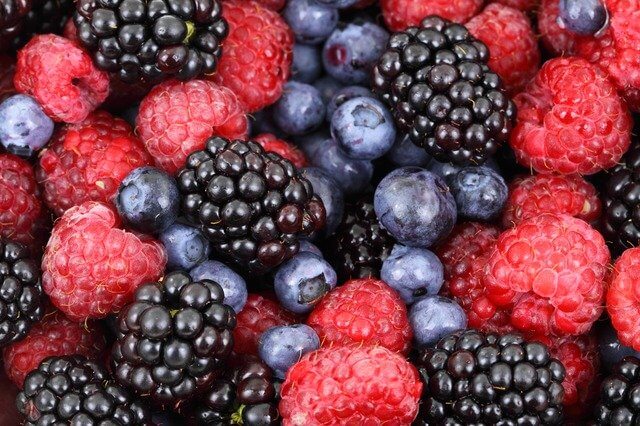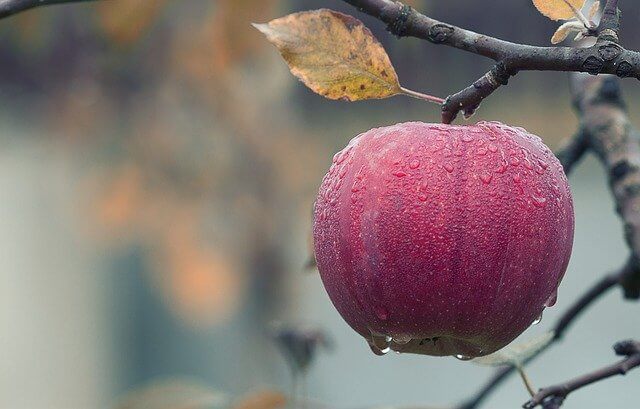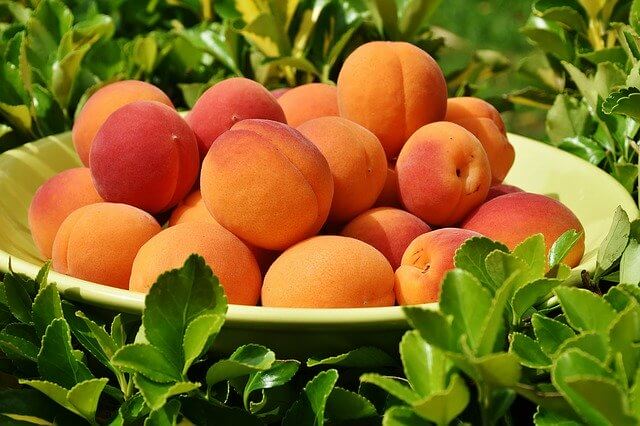Taking fruits to fight constipation is one of the best ways to maintain a regular rhythm of intestinal transit and lead a healthy life.
Moving the intestines helps your body rid itself of toxic waste and keeps the digestive tract smooth. A healthy digestion has been linked to better mood, weight control, a clear complexion, and better general well-being.
To help relieve constipation, it is best to change habits and, if there is a basic disease, treat it. Reducing stress and respecting meal times and moving the bowels will help. The diet becomes fundamental. Water, fiber and good hygienic-dietetic measures are fundamental.
12 fruits to combat constipation
1. Berries

Source : pixabay.com
Most berries are an excellent source of fiber. For example, a cup of fresh strawberries provides 2.9 grams of fiber. The same size portion of blueberries will provide 3.6 grams, blackberries have 8 grams, and raspberries also have 8 grams.
Fiber is essential for a healthy digestion, as it adds volume to the feces, helping the passage of waste through the intestines. While we know the importance of fiber, according to the American Dietetic Association, the average person only consumes about 15 grams a day. That is much less than what we should be consuming.
Women should eat between 21 to 25 grams of fiber a day and men should try to eat between 30 to 38 grams. The American Academy of Family Physicians recommends eating at least two cups of fruits and vegetables a day.
Along with fiber, berries also contain a high water content and can help maintain hydration. Many times, constipation is caused by dehydration. The lack of water hinders the passage of food through the intestines and causes constipation.
In addition, the berries are low in calories. So if you’re taking care of your weight, berries are a great option. One of the best ways to eat berries is in smoothies, with yogurt or in salad with other fruits. You can also make a jelly with pieces of berries inside.
The berries will not only help you go body, they are also loaded with antioxidants that can help you get energy and protect your body from free radicals.
2. Prunes
Plums and their juice have been shown to be effective in relieving constipation. In one study, participants were given a daily dose of dried plums or psyllium. Their bowel movements were monitored for several weeks and the researchers found that dried plums were more effective than psyllium for the treatment of mild to moderate constipation.
Prunes are recommended as the first treatment option. When you consume dried plums or raisins, the contribution of fiber is greater, compared to fresh plums.
When they are soaked and then cooked, the plums provide a compound that contributes, along with the fiber that the fruit has to stimulate intestinal movements. This compound can be very irritating if in addition to constipation, there is inflammation. Therefore, if there is spastic constipation (constipation added to pain and inflammation) it is better to consume fresh cooked plum.
3. Dried fruits
Dried plums are not the only dried fruit that can offer relief from constipation. Most dried fruits benefit digestion because the drying process concentrates all the nutrients of the fruit, including fiber. Popular dried fruits with respectable amounts of fiber include banana chips, dried apricots, dried apples, dried peaches and dried cranberries.
Along with a high fiber content, all dried fruits will offer you additional benefits. Many contain several vitamins, minerals and antioxidants that will help increase your vitality and provide you with the necessary energy, especially if you need to cover your requirements quickly.
Dried fruits contain concentrated amounts of all the components of fruits, including sugar. So, while dried fruits are healthy, you should definitely be careful not to exceed them in the consumption portion. The key to better digestion is to let them soak. In this way, the fiber absorbs water and softens, making it easier to digest. Also, having more aqueous content, will give you more satiety.
4. Apples

Source : pixabay.com
There is a reason why people use the phrase, “An apple a day keeps the doctor away.” Apples are very nutrient-rich fruits that benefit the body in many ways. One of the most notable benefits is helping to keep the digestive system functioning properly. Along with the prevention and relief of constipation, apples have also been adequate to alleviate diarrhea crises.
This is because fiber in apples acts as an agent that increases the volume of stool. This helps move waste through your digestive system if you are constipated and normalizes intestinal transit if you have diarrhea. This popular fruit contains a type of soluble fiber called pectin, which works by binding to fatty substances in the digestive tract (including cholesterol) and promoting its elimination.
In addition to being a fiber-rich food, apples fight inflammation and are an energy boost. Since lack of physical activity is a major factor for constipation, a food that provides glucose and healthy sugars could help you stay active and also facilitate the passage of fecal matter trapped in the digestive system.
Apples are a perfect snack throughout the year. While you can enjoy a fresh apple in the hot summer months, these fruits are also delicious when served hot. During the cold winter months, cook the apples and sprinkle with a little cinnamon on top.
5. Kiwi
Its high fiber content makes kiwis one of the best fruits to help relieve and prevent constipation. This fruit promotes intestinal transit and thanks to an enzyme called actinidin, it also facilitates the digestive process and helps prevent the formation of gases.
In fact, one of the most common natural remedies to treat constipation is to eat a kiwi on an empty stomach in the early morning because its laxative properties will have a greater effect at this time of day. If you do not like the taste of kiwi, I recommend you use it in a smoothie with leafy vegetables or other sour fruits and you will have a perfect drink to improve intestinal transit.
6- Oranges
The citric acid present in oranges makes it a very good fruit to eliminate accumulated waste, get rid of excess liquid and generally improve the digestion of food. If combined with high doses of fiber, you will see that it is perfect to regulate intestinal transit and deal with constipation.
That is why a popular and highly effective method to improve constipation is to make an orange juice, stimulating the motility of the intestines and preventing the accumulation of food debris in the colon.
7- Pears
In addition to being one of the most popular fruits throughout the year, pears are an effective way to treat constipation. They are also very beneficial for strengthening the immune system and protecting against hypertension.
Pears are rich in fiber and a good source of pectin, a substance that contributes to the regulation of bowel movements and purifies the body.
8- Figs
Figs are an excellent fruit for constipation because they provide an effective laxative effect. It is also a fruit that is easily digested, so it protects the stomach at all times and prevents the appearance of other stomach diseases, such as acid reflux or heartburn.
9- Bananas
Bananas are famous for their flavor, consistency and nutritional value. They are easy to digest, therefore, they are also suitable for babies and small children. They contain excellent amounts of fiber, potassium and vitamins. A banana of medium size contains 3 g of fiber, that is to say 10% of your daily requirement.
It is advisable to eat ripe banana to relieve constipation, since the unripe banana can make constipation worse. The carbohydrates it contains when it is still green can cause irritation and poor digestion, as they are more difficult to digest.
10- Avocados
Avocados are unique among fruits. The main reason for this is its fat content. Yes, avocados contain large amounts of good fat that can lower your cholesterol levels. However, other properties of the avocado is its high fiber content, which helps improve the intestinal system. An avocado of medium size (200 g) contains 14 g of fiber. That’s more than pears, apples and bananas.
Prepare a sandwich with the creamy pulp of the avocado for your breakfast. This is an easy resource to combat constipation.
11- Apricots

These orange fruits are an amazing natural remedy for chronic constipation. Whether fresh or dried, peaches are a good source of soluble and insoluble fiber. In addition, they have excellent amounts of beta-carotene, which is a potent antioxidant. Some studies suggest that eating foods rich in beta-carotene can reduce the chance of getting bowel cancer.
12- Fresh plums
Plums may be the youngest version of prunes, but they are effective and will help you regularize bowel movements as they contain stimulant substances. As we said before, avoid the consumption of plum juice or raw plum if, in addition to constipation, you have inflammation.
If you suffer from swelling or colic, you should first consult the doctor and modify your diet by adding soft stimuli such as fruits cooked in compote. Avoid citrus fruits, plums and berries. These fruits have a great stimulating potential thanks to their content of acids that can cause more irritation.
The best fruits in these cases are apples, peaches, pears, ripe bananas, apricots and quinces. They provide a good amount of pectins, soluble fiber that only acts by attracting water to the intestinal lumen and increasing the volume of feces. By forming a gel, bowel movements occur without pain.
Finally, avoid eating the peels and hard parts of the fruits if you have inflammation. The insoluble fiber found in them produces the same effect as acids, although it causes a mechanical and non-chemical stimulation to your intestine, but it can increase the symptoms of pain, inflammation and swelling. The fiber must be increased gradually so as not to cause side effects due to the high proportion of fermentable sugars that it contains, such as fructose. Start with 2 servings per day and evaluate how you feel.